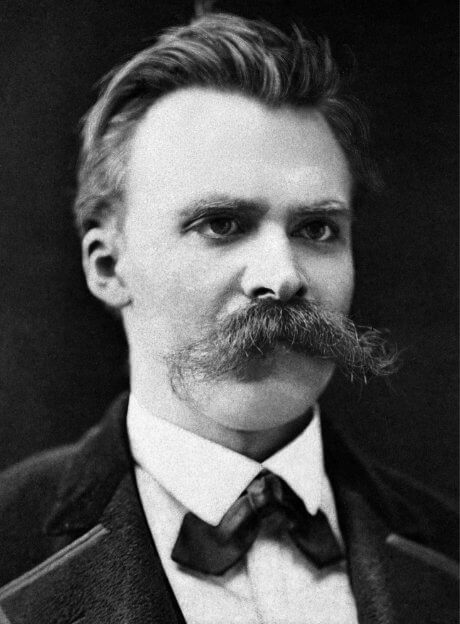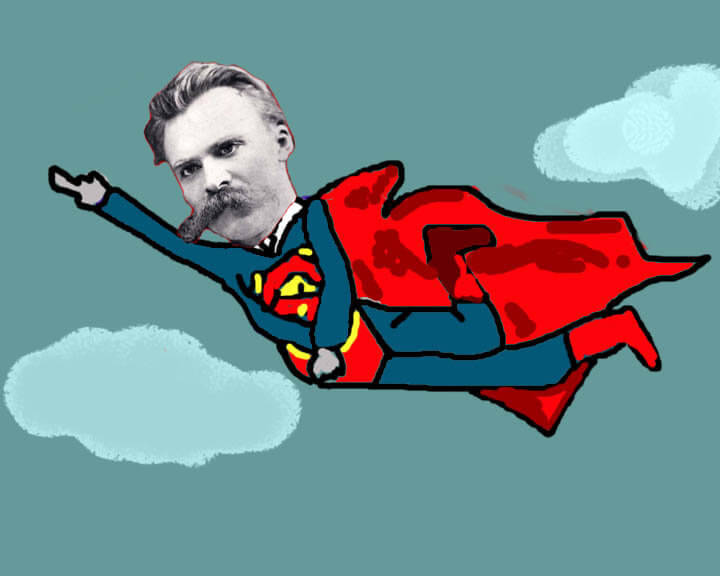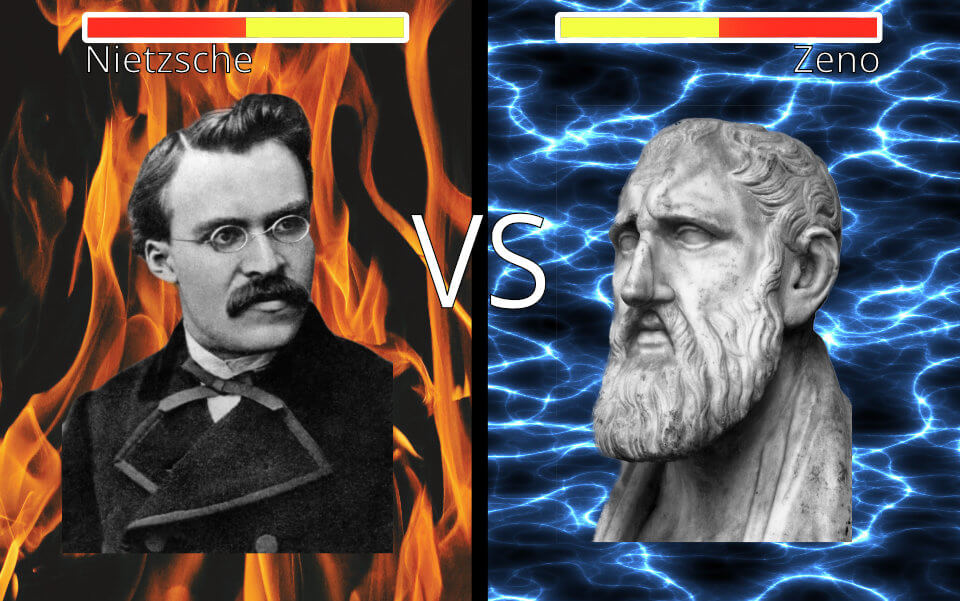This post is part of a larger deep dive
Curious about the role of Stoicism and Nietzsche's philosophy of the future in Dogville? Check out Dogville Explained!
Or read the full Dogville article!
This post is part of a larger deep dive
Curious about the role of Stoicism and Nietzsche's philosophy of the future in Dogville? Check out Dogville Explained!
Or read the full Dogville article!

Discussing Nietzsche now may look like a bit of a curious leap to say the least. However, bear with me for a minute as both Stoicism and Nietzsche’s philosophies will be important for our discussion of Dogville.
The way we use to make sense of the world is through morality – principles regarding to what we believe is right/wrong or good/bad. Whenever we act, we base our actions according to these principles we have internalised (e.g., I should not steal, I should be a good husband, I should be compassionate).
Up until about the end of the 18th century, Christianity was still in full swing across Europe. Christians acted according to God’s values and were taught that obedience to those values bought them a place in heaven.
And so, they were encouraged to think of this world as only a preparation for a better world, the afterlife; that they would be rewarded for good deeds and punished for bad ones; and that piety, forgiveness and compassion should be the order of the day.
They lived their lives according to God’s moral principles. But what if people began to call these principles into question?

At the end of the 19th century, with advances of technology and a shift towards scientific thinking, religious faith showed a drastic decline in nearly every society.
Friedrich Nietzsche, a German philosopher well-known for his attacks on Christianity, famously declared that “God is dead”, in the sense that people stopped believing in God.
Even though most of Nietzsche’s philosophical ideas reflect a deeply anti-christian sentiment, when Nietzsche declared that “God is Dead”, he didn’t only specifically mean the christian God. He actually meant any doctrine set at denying this life on Earth in favour of a metaphysical world (a world beyond this one, such as the celestial world of Christianity).
Because people’s beliefs were often based on metaphysics (e.g., that this world is somewhat imperfect and only a preparation for the afterlife), Christians are taught that they should deny the material world, and hope for a celestial, purer and better world. However, if God is dead, we are now faced with a reality in which none of our previous values hold, including the prospect of a better world beyond this one.
Nietzsche believed that when the meaning and values we believe in are shattered, we enter a depression, in which we feel that nothing else makes sense, that our life is essentially meaningless devoid of purpose (consider a devout Christian who suddenly has lost her faith). Nietsche called this condition nihilism, and he believed humanity were gradually entering this state of confusion and absurdity.
To Nietzsche, however, this was not a reason to despair. In fact, he believed that we should take the opportunity to embrace this emptiness, because now we are really free from the reigns of divinity and delusional idealism.
Nietzsche proposed a complete “revaluation of all values”, that is, to question our ideas about ethics and the meaning of life and start forming our own values based on what we desire.
We might have always believed a certain attitude towards life is good, when in fact it is life-denying.
For example, a homossexual individual might hide his true sexual orientation for fear that either his family or society might not accept his sexual preferences.
Nietzsche would argue, however, that we should simply follow our instincts, have the pride and strength to follow them through. This is, for Nietzsche, life-affirming – we are not bound to external rules imposed on us, we become truly free.
He actually goes further and suggests that we transform ourselves into gods. This involves the destruction of the old world in order to create a new order that does humanity justice.
Enter the Übermensch.

Übermensch is a term that is often translated to Superman, which, personally, I think is an unfortunate translation nowadays, as it evokes images of the famous DC comics hero. Beyond-man or Over-man have been proposed as better translations, but I’ll stick to the German word.
In many texts, we see this term being associated with a single individual, but, in fact, it is more of a superior stage of humankind. For example, Homo Sapiens is not a single individual, but it represents a certain stage of human evolution. The Übermensch would be an even superior stage. In fact, the distance between Übermensch and Homo Sapiens, would be equivalent to the distance between the Homo Sapiens and non-human apes!
Now, Nietzsche wasn’t referring to the Übermensch as the result of a purely evolutionary process. Rather, he believed the Übermesnsch to be superior in the intellect, best characterised by it’s ability to leave behind Christian, ascetic and pessimistic beliefs that undervalue our life in this world. The Übermensch thrives in personal autonomy (assert that we are different from everyone else), and staves off assimilation by any community whatsoever.
But what are the steps to become a Übermensch?
Nietzsche viewed every living being as a manifestation of disparate (unconscious) forces, an idea that would soon shape Freud’s conception of the Unconscious mind (although Freud never actually acknowledged it). It is these forces that determine our behaviour, for example, whether we show altruism or egoism.
A complete revaluation of values consists in accepting these forces (both good and bad) that reside deep within our bodies. Nietzsche calls this “will to power”. This means making our own decisions, not obediently follow some “herd” mentality. We should create a kind of life that we are proud of and adhere to our own values, the values we want to live for, without caring what other people think or do. What matters is our own sense of good.
In other words, the Übermensch isn’t afraid to assimilate and work with these unconscious forces that reside in him- or herself, and doesn’t feel guilty about it. They have the courage to overcome their flaws and fears and have the ability to redifine their moral values.
Note that “will to power” is not a will to dominate others as the name might imply, but rather a drive to assert oneself, make ourselves unique and different. Perhaps replacing the word “power” with “potential” would be a better approximation of Nietzsche’s intentions.
A good example is how Nietzsche views Christianity’s stance on sex. Christianity advocates chastity and sees sex as something sinful and preverse. However, to Nietzsche, this goes against our very natural instinct to procreate – the most fundamental affirmation of life.
Of course, Nietzsche isn’t suggesting you should act amoral – I believe Nietzsche’s idea was to use instinctive forces in creative and useful ways that benefit society and humanity in general (such as in art).
On the other hand, Nietzsche proposed, somewhat controversially, that society shouldn’t care about providing the greatest well-being for the sake of the majority of people. Rather, he believed that any human culture is perfectly justified by forming a few great individuals (in fact, Nietzsche had such aversion to “herd mentality”, that he went as far as suggesting to “sacrifice” them if that sped the arrival of the Übermensch).
He went further saying we should only love man insofar as it leads us to the Übermensch.

To Nietzsche, if people embraced their “will to power” (i.e., your commitment to make your own moral values, rather than follow “herd mentality”), they would think of good and bad as anything that ultimately benefited or hindered them, respectively, when working towards their goals.
This means that if lying brought about fullfillment, people following master morality would have no compunction in doing so. Nietzsche believed, again controversially, that even oppression would be justified if it meant the greater good.
So, for master morality the good qualities are strength, power, glory, greed and courage, as these are often needed when we wish to impose our views on the world.
The majority of people, however, would not be in the position to fulfill their goals. So they see masters’ traits with envy and jealousy.
Because they cannot attain the same attributes as masters have, they turn those master-morality attributes, such as strength, power, glory, greed and courage into evil “things”. For the slave-morality cohort, “good” becomes humility, forgiveness, compassion and altruism.
To exemplify the difference between master and slave morality in a context we are all familiar with, let’s imagine a couple having dinner at a restaurant. The man follows slave-morality so let’s call him Slavie; the woman follows master-morality so let’s call her Mastie.
Now, when the waiter comes with their orders he accidentally trips and spills all the food and drinks onto Slavie’s and Mastie’s clothes.
Mastie gets up, and ignoring inquisitive looks, she speaks with firmness and determination that the restaurant must pay for a new dress.
Slavie tries to calm Mastie down. Although his suit is also ruined beyond repair, he says that the waitress cannot be blamed, that this was simply an unfortunate accident, and that she is embarassing herself.
Nietzsche would see Slavie’s behaviour as turning the master-morality of Mastie (i.e., her strength in taking what she wants) into a vice (i.e., violent behaviour and irrational thinking). In fact, since slaves are unable to act their strength, they consider its opposite a virtue. For example, incapable of taking revenge on the restaurant, Slavie adopts a stance of forgiving.

Now, there are many texts revealing why Nietzsche wasn’t fond of Stoicism, but I would go as far as saying that I believe there are many more similarities than dissimarities (but I’ll leave that for the comment/forum sections).
What Nietzsche disliked about Stoicism was not really Stoicism as a philosophical doctrine, but rather the idea of a rules-based system that should be applied to each and everyone of us.
Stoicism, in one way or another, promotes eudamonia as an ideal way of living, that every single one of us should aim for. If we all follow Stoicism’s notion of virtue, then we will all lead the same good life Nature had planned for us.
Nietzsche abhorred this kind of egalitarianism, as he believed it crushed individuality and hampered the expression of talent in truly great individuals. Humans should create their own set of values, find their own way, instead of following philosophies that emphasize the pursue of some ostensibly objective truth, like Stoicism’s virtue.
A second point of Nietzsche’s critique was that Stoicism teaches us to treat all external things as indifferent, and to detach our feelings from them. Nietzsche, in contrast, believed we should not ignore these energies. We should embrace our instincts, both good and bad, and channel them into creative activites, to assert ourselves and to become different from everyone else.
A third point of criticism, Nietzsche argued that morality is nothing more than self-interest in disguise. Whereas Stoics have an established idea of what it means to be virtuous, Nietzsche tells us that behind most human actions (some of which we might believe are purely virtuous) hide unconscious forces that might not be at all that noble.
For example, let’s say you are waiting in a long line at the supermarket, and suddenly another cashier opens next to you. People behind you are quick to realise this and rush to be the first ones to get there. You don’t find this fair. After all, you have been waiting longer and deserve to be the first one to get attended. You think how uncivilized that behaviour is and that people should be more respectful.
Rather than agreeing with you, Nietzsche would probably argue that the reason you are upset is not that you find respect and civility noble. Maybe you wish (unconsciously or not) that you were more like the people that arrived first at the cashier. However, you dare not, for fear of being told off.
So, behind your seemingly moral attitude hides a very non-virtuous sentiment: envy.
This was a magnificent review of a great movie. I enjoyed your review as much as I enjoyed the movie itself. However, I, with a background in philosophy and German, read a lot of Nietzache in both German and English. I also know how Nietzsche was MISUSED to back up NAZI propoganda. I am not trying to say that you were inaccurate in what you said about Nietsche’s writing. but your metaphors and examples completely missed the target, in my opinion. You described a Nietsche who would resemble Charles Atlas, and who, if he was coming towards you on the street would look like a bruiser.
In reality, Nietsche was a smallish weakling with a huge brain. Nietsche was all about the brain. Nietsche would never try to be first in line in a crowded store. Probably the only time in his life that he got into a fight, was when he tried to stop a man on the street from beating his horse. and by doing that, he had a complete mental and physical breakdown, and never recovered,
Nietsche was not a boxing champion, he was a thinking champion.He was the son of a Lutheran minister. He was not religious, but he was a genius.
Philosophy-wise, Nietsche was one of the first Existentialists. He didn’t believe in trying to figure out what reality was, he believed in using your brain to mold reality. Your brain, not your bicepts.And I think my version of Nietsche also works extremely well in analyzing this movie. Grace was ten times the IQ of anyone in Dogville. She was teaching kids stoicism. She could understand what was going on around her. Physically, she was more like Nietsche than Marcus Aurelius. She was raped and abused daily until she decided that changing reality was much more effective than trying to cope with it. So, she used her mind to mold reality by having daddy put the wiseguys to work and “fix” the town. You go, girl!
Great movie, Great philiscophical review above.
Hi David,
Many thanks for your insightful comment, and I’m happy you enjoyed the article!
I completely agree with what you say above. The examples described in the article were just my attempt at linking Nietzsche’s teachings with more mundane, daily-life experiences that readers could relate to.
In particular, people getting angry at others skipping the line probably aligns with Nietzsche’s proposition that seemingly honourable attitudes can be often expressions of self-interest or envy in disguise. I admit though that there’re likely better analogies.
But, yes, Nietzsche would have (almost surely) sucked it up and stayed in line 😀
I was looking for a satisfying analysis after watching the film with my wife. It was my 3rd or 4th time seeing the film, and it’s one of my all time favorites. Now, in my 40’s, I think I fully appreciate the philosophical implications. Your essay really hit the nail on the head for me. Thank you.
Hi Familydude,
You’re very welcome, and thank you for your comment!
I watched Dogville for the first time when it came out in the cinema back in 2003 and I loved it. Rewatched it after 20 years with renewed eyes and a tad more philosophical, and it was a whole different experience.
Only great films have this capacity to make us feel differently as we mature – Dogville is certainly one of them!
I wholeheartedly agree. I’m now interested in learning more about Nietzsche. Do you have a recommendation on where to go, or what book to begin with? Thanks
I read two or three books on Nietzsche for a general overview of his work, as well as translations of some of original texts such as The Antichrist (which were surprisingly not extremely difficult to follow).
However, there are plenty of youtubers out there with a Philosophy background who do a very good job at explaining philosophical ideas with plenty of quotidian examples, and this is what I recommend as a first dive into Nietzsche. Two of my favourite channels while writing up the article were: Personal Power and Philosophy Vibe.
Good luck! I had a lot of fun learning Nietzsche’s philosophy, and I’m sure you’ll do too 😉
Incredible article! This movie put me in quite a depressive episode but your analysis really helped me understand why it made me feel so powerless. I also found Grace’s change to be reminiscent of Camus’ philosophies on absurdity and sincerity.
Hi Mike,
Thank you very much for your comment!
I have to admit that I know very little about Albert Camus’ philosophies, but you’ve certainly piqued my interest. So thanks for the suggestion, I’ll check it out!
Outstanding
Great article! Dogville is one of my favorite movies and to be honest I identify with Grace regarding her stoic values. Now I am struggling a little with the consequences of my virtue approach towards people. At some point earlier I decided to reject the master attitude since it wasn’t always understood (i.e. at work), I fell into the herd mentality trap. It is not easy, you try to be good and go beyond for others – they kick you in the butt, you control the situation – they are scared of you.
After this read I am at least a little bit more aware and eager to get a better understanding of Nietzsche’s position.
So in some way, you changed my life 😀 thanks!
Hi harofld. Thank you for your comment, and I’m very happy to know that you found the article helpful.
Indeed, I identify strongly with what you said about the difficulty in displaying a type of master morality in places where it is often misunderstood. I have to confess I also tend to follow a herd mentality: trying to appease others, being diplomatic and uncontroversial and exercise good judgement, even if that puts me at a disavantage sometimes.
Nevertheless, the research I did for Dogville, placing Stoicism and Nietzsche’s philosophy in a sort of opposition, was at least helpful in making me aware of some of my own limitations.
I don’t think I’ve ever read an article or a review this good. It captures everything that it needs to capture, in terms of dissecting the essense of the movie AND in terms of debating through different philosophies. 100/100. Thank you so much for putting in the effort and time. Remarkable.
Hi Kate. Thank you very much for your very kind words and I’m really glad you enjoyed the article. I’ll definitely do my best to keep publishing these articles as often as I can 😉 Hope to hear from you again soon!
This article was as good as the movie, I really appreciate the time the autor took to write it, as a practitioner Stoic I loved to read a film review that was very well informed. And beyond that it was just so complete and satisfying to read. Thank you, looking forward to read the other articles.
Hi Ztoicfox. Many thanks for the kind words, I’m really happy that you enjoyed the article. It’s comments like yours that really make my day :). Cheers!
Great
Loved the movie but…
I loved the movie, the concept, the aesthetic, the philosophy behind and the acting! All great, my only but, was the camera work, I understand handheld makes total sense with the whole line of the movie but personally it was to pronounce. If it was made more subtle I would have given 5 stars.